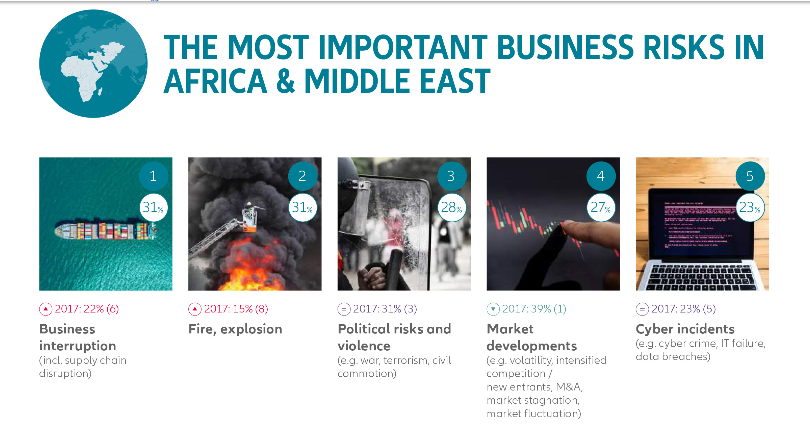Allianz Risk Barometer: Business interruption dominates business risks in Africa

They take aim at the backbone of the connected African economy and, when they strike, can jeopardize the success, or even the existence, of companies of every size and sector. Business interruption (#1 with 31% of responses, up from #6 in 2017), fire and explosion (#2 with 31%, up from #8 in 2017) and political risks (unchanged at #3 with 28%) are major risks that businesses will be facing this year. These are the key findings of the seventh Allianz Risk Barometer, which is published annually by Allianz Global Corporate & Specialty (AGCS).The 2018 report is based on the insight of a record 1,911 risk experts from 80 countries.
Market developments (#4 with 27% of responses, down from #1 in 2017), cyber incidents (unmoved at #5 with 23%), natural catastrophes (#6 with 22%/ #7 in 2017), changes in legislation and regulation; theft, fraud and corruption (joint 7th with 22% and 21%/ #4 and #9 in 2017), macroeconomic developments (#9 with 15%, down from #2 in 2017) and loss of reputation or brand value (unchanged at #10 with 11%) complete the top 10 risks.
“Businesses in Africa are deeply concerned about the impact of business interruption, which could result from traditional exposures, such as fire, natural disasters and supply chain disruption, to new triggers stemming from digitalization and interconnectedness that typically come without physical damage, but with high financial loss. Breakdown of core IT systems, terrorism or political violence events, product quality incidents or an unexpected regulatory change can bring businesses to a temporary or prolonged standstill with a devastating effect on revenues,” says AGCS Africa CEO Thusang Mahlangu.
BI can have a tremendous effect on a company’s revenues. Yet its impact is one of the hardest risks to measure. It is also the most important risk for the sixth year in a row globally, ranking top in 13 countries in Europe, Asia Pacific, and Africa & Middle East regions. “No business is too small to be impacted,” explains Mahlangu, “A severe interruption can even have a terminal impact, particularly for smaller companies. But as many businesses transition from being rich in physical assets to deriving more value from intangibles and services, increasingly, BI is being triggered by non-traditional risk exposures which don’t cause physical damage but result in lost income – so-called nondamage business interruption (NDBI).”
Fire and explosion is the major peril for businesses in Burkina Faso and Togo appearing in the Risk Barometer for the first time. It features in the top 10 risks for Nigeria, Morocco, South Africa, Ivory Coast and it is not surprising to it in the second position. Fire and explosion incidents are the leading driver of business interruption insurance claims over a five-year period.
In 2017 political uncertainty, dominated the business headlines in Africa. Heightened political tensions saw a military coup in Zimbabwe, a widely disputed election in Kenya and shaky cabinet reshuffles in South Africa. These might appear as isolated events but they are an amalgam of events that increased political risks in Africa, affected businesses and will continue to make an impact in 2018.
Meanwhile, the risk impact of changes in legislation and regulation climbed very high as many African governments are sternly stepping in with laws governing information and ethical operations of businesses. In Africa, changes in regulation are often associated with sanctions and regional trade bloc legislations.
Cyber incidents through events such as WannaCry and Petya ransomware attacks brought significant financial losses to a large number of businesses. More than 30 million South Africans’ personal information was exposed online in what is considered country’s biggest data breach. Cyber threats also vary according to company size or industry. “Small companies are likely to be crippled if hit with a ransomware attack, while larger firms are targets of a greater range of threats, such as the DDoS attacks which can overwhelm systems,” says AGCS Cyber Insurance Expert Nobuhle Nkosi.
Natural catastrophes moved from #7 to #4 and also returned to the top three business risks globally. “The impact of natural catastrophes goes far beyond the physical damage to structures in the affected areas. As industries become leaner and more connected, natural catastrophes can disrupt a large variety of sectors that might not seem directly affected at first glance around the world,” says Ali Shahkarami, Head of Catastrophe Risk Research, AGCS.
While businesses in Africa are less worried about risks such as volatility and commodity prices stemming from market and macroeconomic developmentsstudies show commodity price shock has driven debt higher weighing on smaller economies. However reforms are paying off in Egypt and growth is set to recover progressively in Nigeria and South Africa.
At the lowest of the spectrum, are risks emanating from climate change and increased volatility of weather. At 22% in 2018, risks from natural catastrophes are quite unpredictable and increasingly many African corporations are wary of them. This awareness is explained by the 5% increase in the ratings from over 50 respondents in South Africa, Morocco and Nigeria. Research indicates that the current La Niña episode has the potential to alter weather patterns in predictable ways, particularly in southeastern Africa.



